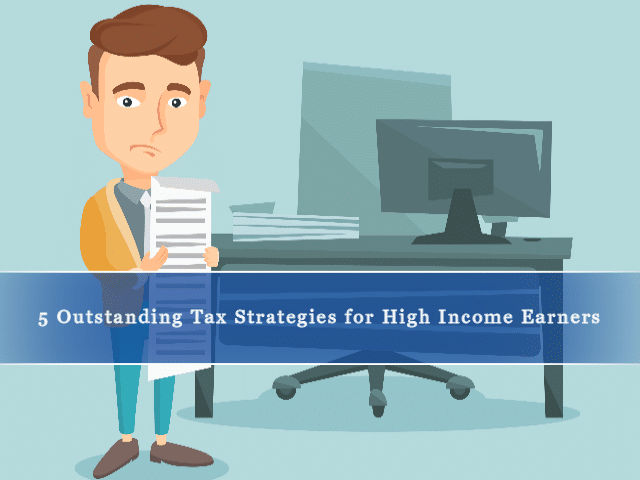Tax Strategies for High-Income Earners
When your income exceeds certain thresholds, you may become subject to higher tax rates, which can sometimes approach or exceed 50% of your total income. This can have a significant impact on finances, particularly when a substantial portion of wealth is tied up in non-liquid assets.
For this reason, many high-income earners seek assistance from financial advisors who specialize in developing and implementing strategic tax planning solutions. These strategies are highly individualized, depending on each person’s financial circumstances, asset structure, and long-term goals.
Working with a knowledgeable wealth management advisor can help individuals with significant liquid assets — often those managing $500,000 or more — develop tailored approaches to mitigate tax exposure while maintaining investment growth, estate planning, and retirement strategies.
Private wealth management firms that focus on serving high-net-worth and ultra-high-net-worth individuals are familiar with the specialized strategies often used for tax efficiency, wealth enhancement, and risk management. Developing a comprehensive financial plan that integrates retirement planning, estate planning, and tax mitigation can be an important step toward sustaining long-term financial health.
In this article, we will explore several smart tax strategies for high-income earners and address key questions such as:
Table of Contents

5 Outstanding Tax Strategies for High-Income Earners
1. Invest in Tax-Free Savings Accounts (TFSA)
One of the effective tax strategies for high income earners is utilizing tax-free savings accounts. Contributions made to these accounts grow tax-free, and withdrawals are also exempt from taxation. This allows investments within these accounts to generate income without triggering additional tax liability. Examples include Roth IRAs and Health Savings Accounts, which can play a significant role in long-term tax planning.
2. Health Savings Account (HSA)
A Health Savings Account (HSA) can be an important part of retirement and healthcare planning. HSAs allow you to set aside pre-tax income to cover qualified medical expenses not covered by insurance, such as dental and vision care. Contributions to an HSA are exempt from federal, state (in most cases), and FICA taxes, and withdrawals for medical expenses are tax-free. High-net-worth individuals can benefit by allowing these accounts to grow investment earnings tax-free while managing healthcare costs efficiently.
3. Retirement Savings Accounts
Retirement savings accounts, such as 401(k)s and IRAs, offer another valuable tax management opportunity. Contributions can reduce current taxable income while allowing investment earnings to grow tax-deferred. Taxes are generally only paid when withdrawals begin, typically in retirement, when individuals may be in a lower tax bracket. Strategic contributions to retirement accounts are a core component of tax strategies for high income earners.
4. Making a Charitable Donation
Philanthropic giving not only supports important causes but can also provide significant tax advantages. Donations of cash, appreciated securities, or other long-term assets can qualify for tax deductions, helping to lower taxable income. Donating appreciated assets like stocks, bonds, or real estate may also help individuals avoid capital gains taxes while allowing deductions of up to 30% of adjusted gross income.
4. Tax Residency Planning
Investors with properties, businesses, or interests across multiple states must be mindful of residency rules to avoid dual taxation. Some states impose income taxes on business earnings even if the individual is not a resident. High-net-worth individuals often evaluate relocating to states with no income tax as part of post-retirement planning. Understanding residency laws and planning ahead can significantly impact long-term tax efficiency.
Finding the right financial advisor who understands the needs of high-net-worth individuals and the complexity of managing significant assets can make a meaningful difference. Strategic tax planning is most effective when aligned with a broader wealth management approach that considers investments, retirement, and estate goals.

Why Do Wealthy Investors Have to Pay Higher Taxes?
The progressive tax system is designed so that taxpayers are charged taxes based on their taxable income. If you’re asking, “What income levels pay the most taxes?” the answer is straightforward: as income levels rise, individuals move into higher tax brackets and face a larger tax burden.
Understanding your taxable income is essential in determining how much you owe. Taxable income is typically calculated by subtracting IRS-permitted deductions from your adjusted gross income. The resulting figure identifies the federal tax bracket applicable to your situation.
Wealthy investors are subject to a variety of taxes, including federal and state income taxes, capital gains taxes on the sale of high-value assets, and estate taxes. These taxes can significantly impact overall wealth if not managed carefully.
For high-net-worth individuals, applying strategic tax planning is a vital part of preserving wealth. Just as investors use strategies to optimize their investment portfolios, tax advisors can recommend tax strategies tailored to help reduce the overall tax burden. Developing a well-structured financial plan that incorporates tax efficiency is essential for sustaining and growing long-term wealth.
In the sections that follow, we will explore effective tax strategies for high-income earners and provide insights into managing wealth more efficiently through informed financial planning.

4 Tax-Efficient Investing Strategies for High Earners
In this section, we will explore answers to the question, “How do high-income earners reduce taxes?” These strategies can be effective for individuals managing significant wealth, but it is important to remember that implementing the best tax plan depends on personal financial circumstances and often requires professional guidance.
1. Family Income Splitting and Family Trusts
Family income splitting is a foundational tax strategy that involves shifting income to family members in lower tax brackets. One approach is setting up a prescribed rate loan, where income is formally loaned to a spouse or child at a government-specified interest rate. Properly structured family trusts can also allow income to be distributed to family members annually without being subject to high marginal tax rates. Spousal loans are another method, enabling capital gains and investment income to be taxed at the lower rate of a spouse rather than at the higher-income earner’s rate.
2. Invest in Your Children’s Education
Contributing to a registered education savings account (RESP) is another strategic way for high-income earners to maximize tax efficiency. Income in an RESP grows tax-free, and withdrawals are taxed at the student’s generally lower tax rate. This strategy supports long-term education planning while also benefiting from deferred tax growth and potential government grants.
3. Choosing Tax-Efficient Investments
One important aspect of applying tax strategies for high-income earners is selecting tax-efficient securities and assets that help generate profits while minimizing tax liability. Choosing the right investment vehicles can play a significant role in preserving wealth and supporting long-term financial goals.
Examples of tax-efficient investments include flow-through shares and certain types of life insurance policies. Flow-through shares involve investing in resource-based companies, such as those engaged in oil, gas, renewable energy, or mining. With the appropriate structure, these companies can pass their exploration and development expenses on to investors, who may then deduct these expenses on their tax returns, helping to reduce overall taxable income.
Including life insurance as part of a broader wealth strategy is another common approach. Certain life insurance policies are tax-exempt, offering advantages in both asset protection and wealth transfer. Upon the policyholder’s death, the proceeds from a tax-exempt policy can help cover estate taxes, reducing the need for heirs to sell off assets and preserving more wealth for future generations.
Strategically incorporating tax-efficient investments into your portfolio can contribute to a more resilient, long-term financial plan and provide greater security for both you and your beneficiaries.
4. Invest in Dividends
Income generated through qualified dividends and long-term capital gains is generally taxed at lower rates than regular earned income. Many high-net-worth individuals prioritize dividend-paying investments to enhance after-tax returns, helping to grow wealth while minimizing tax liabilities.
Using these strategies effectively requires personalized planning based on your overall financial picture, goals, and risk tolerance. Tax-efficient investing remains an important part of preserving and expanding wealth over time.

High Income Tax Planning
Tax Basics and 2022 Tax Legislation
Your tax bracket determines the percentage of your taxable income that will be paid in federal income taxes. Taxable income is calculated by taking your adjusted gross income (AGI), which is your gross income minus above-the-line deductions, and subtracting either the standard or itemized deductions (below-the-line deductions). After calculating your tax owed, tax credits may further reduce the final amount payable. It’s important to note that the current federal tax rates are scheduled to expire after 2025.
2022 Federal Tax Brackets
The table below outlines the 2022 tax brackets. Federal income tax is calculated progressively: different portions (“chunks”) of your income are taxed at different rates.
| Tax Rate | Single Filers | Married Filing Jointly | Heads of Households |
| 10% | $0 to $10,275 | $0 to $20,550 | $0 to $14,650 |
| 12% | $10,275 to $41,775 | $20,550 to $83,550 | $14,650 to $55,900 |
| 22% | $41,775 to $89,075 | $83,550 to $178,150 | $55,900 to $89,050 |
| 24% | $89,075 to $170,050 | $178,150 to $340,100 | $89,050 to $170,050 |
| 32% | $170,050 to $215,950 | $340,100 to $431,900 | $170,050 to $215,950 |
| 35% | $215,950 to $539,900 | $431,900 to $647,850 | $215,950 to $539,900 |
| 37% | $539,900 or more | $647,850 or more | $539,900 or more |
Tax Rates on Capital Gains and Dividends
Use the following table to calculate taxes owed on qualified dividends and long-term capital gains:
| Tax-Filing status | 0% Rate | 15% Rate | 20% Rate |
| Single | $0 to $41,675 | $41,676 to $459,750 | $459,751 or more. |
| Married Filing Jointly | $0 to $83,350 | $83,351 to $517,200 | $517,201 or more. |
| Married Filing Separately | $0 to $41,675 | $41,676 to $258,600 | $258,601 or more. |
| Head of Household | $0 to $55,800 | $55,801 to $488,500 | $488,501 or more. |
The SECURE Act
The SECURE Act, enacted in 2019, made several significant changes, including:
- Raising the required minimum distribution (RMD) age from 70½ to 72.
- Increasing contribution limits for IRAs and 401(k) plans ($20,500 and $14,500, respectively).
- Raising the Roth IRA income ceiling.
- Increasing the Social Security wage base.
- Adjusting limits related to long-term care insurance.
Above-the-Line Deductions
Above-the-line deductions reduce your AGI, which in turn lowers your taxable income. Common deductions include contributions to retirement plans, health savings accounts (HSAs), and certain charitable contributions, particularly charitable rollovers from IRAs.
Below-the-Line Deductions
Below-the-line deductions are either standard deductions based on your filing status or itemized deductions, which may include charitable contributions, mortgage interest, and qualified medical expenses.
Defer or Accelerate Income
Certain types of income can be deferred or accelerated based on strategic tax planning. For example, with the cash method of accounting, collections can be accelerated, and payments can be deferred to manage taxable income across different years for optimal tax outcomes.
Income Tax Deferral
Tax-deferred investments can help reduce the current year’s taxable income. Contributions to retirement plans like IRAs and 401(k)s are taxed upon distribution, often when the individual is in a lower tax bracket. Other tax-deferred opportunities include educational savings plans and cash-value life insurance policies.
Conclusion
Although this is not an exhaustive list of tax strategies for high-income earners, these are some of the more commonly used methods to help lower the amount owed on tax returns. For a fully personalized tax reduction plan, consulting with an experienced financial advisor or wealth management professional can provide valuable insights tailored to your specific financial situation.
Effective tax planning strategies can play an important role in protecting wealth, minimizing tax liabilities, and supporting long-term financial goals.
To continue exploring options for optimizing your financial strategy:
